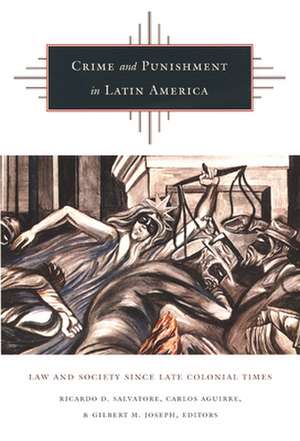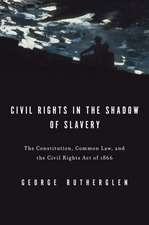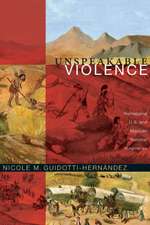Crime and Punishment in Latin America – Law and Society Since Late Colonial Times
Autor Ricardo D. Salvatore, Carlos Aguirre, Gilbert M. Josephen Limba Engleză Paperback – 19 sep 2001
While disassociating law from a strictly legalist approach, the volume showcases a number of highly original studies on topics such as the role of law in processes of state formation and social and political conflict, the resonance between legal and cultural phenomena, and the contested nature of law-enforcing discourses and practices. Treating law as an ambiguous and malleable arena of struggle, the contributors to this volume scholars from North and Latin America who represent the new wave in legal history that has emerged in recent years-- demonstrate that law not only produces and reformulates culture, but also shapes and is shaped by larger processes of political, social, economic, and cultural change. In addition, they offer valuable insights about the ways in which legal systems and cultures in Latin America compare to those in England, Western Europe, and the United States.
This volume will appeal to scholars in Latin American studies and to those interested in the social, cultural, and comparative history of law and legal phenomena. "Contributors. "Carlos Aguirre, Dain Borges, Lila Caimari, Arlene J. Diaz, Luis A. Gonzalez, Donna J. Guy, Douglas Hay, Gilbert M. Joseph, Juan Manuel Palacio, Diana Paton, Pablo Piccato, Cristina Rivera Garza, Kristin Ruggiero, Ricardo D. Salvatore, Charles F. Walker "
""
Preț: 306.77 lei
Nou
Puncte Express: 460
Preț estimativ în valută:
58.70€ • 60.65$ • 48.83£
58.70€ • 60.65$ • 48.83£
Carte tipărită la comandă
Livrare economică 20 martie-03 aprilie
Preluare comenzi: 021 569.72.76
Specificații
ISBN-13: 9780822327448
ISBN-10: 0822327449
Pagini: 480
Ilustrații: 11 tables, 5 figures
Dimensiuni: 296 x 320 x 42 mm
Greutate: 0.63 kg
Ediția:New.
Editura: MD – Duke University Press
ISBN-10: 0822327449
Pagini: 480
Ilustrații: 11 tables, 5 figures
Dimensiuni: 296 x 320 x 42 mm
Greutate: 0.63 kg
Ediția:New.
Editura: MD – Duke University Press
Cuprins
Contents:
Introduction
Writing the history of law, crime and punishment in Latin America, Carlos A. Aguirre University of Oregon and Ricardo D. Salvatore Universidad Torcuato di Tella, Buenos Aires
Part 1: Legal mediations: State, society, and the conflictive nature of law and justice
Crime in the time of the great fear: Indians and the state in the Peruvian southern Andes, 1780-1820, Charles WalkerUniversity of California, Davis
Women, order and progress in Guzman Blancos Venezuela , 1870-1888, Arlene Diaz Indiana University
Judges, lawyers, and farmers: Uses of justice and the circulation of law in rural Buenos Aires, 1900-1940, Juan Manuel R. PalacioUniversidad Nacional de San Martin, Buenos Aires
Work, property , and the negotiation of rights in the Brazilian cane fields: Campos, Rio de Janeiro, 1930-1950, Luis A. GonzalezUniversity of Minnesota
Part 2: The social and cultural construction of crime
The criminalization of the syphilitic body: prostitutes health, crimes, and society in Mexico City, 1867-1930, Cristina Rivera-Garza San Diego State University
Healing mischief: Witchcraft in Brazilian law and literature, 1890-1922, Dain Borges University of California, San Diego
Passion, perversity, and the pace of justice in Argentina at the turn of the last century, Kristin Ruggiero University of Wisconsin-Milwaukee
Cuidado con Los Rateros: the making of criminals in modern Mexico City Pablo Piccato Columbia University
Part 3: Contested meanings of punishment
The penalties of freedom: punishment in post-emancipation Jamaica, Diana Paton University of Newcastle
Death and liberalism: Capital punishment after the fall of Rosas, Ricardo D. Salvatore Universidad Torcuato di Tella, Buenos Aires
Disputed views of incarceration in Lima, 1890-1930: The prisoners agenda for prison reform, Carlos A. Aguirre University of Oregon
Girls in prison: The role of the Buenos Aires Casa Correccional de Mujeres as an institution for child rescue, 1890-1940, Donna J. GuyUniversity of Arizona
Remembering freedom: Life as seen from the prison cell (Buenos Aires province, 1930-1950), Lila M. Caimari University of Quilmes, argentina
Afterword
Law and society in comparative perspective, Douglas Hay York University, Ontario
Introduction
Writing the history of law, crime and punishment in Latin America, Carlos A. Aguirre University of Oregon and Ricardo D. Salvatore Universidad Torcuato di Tella, Buenos Aires
Part 1: Legal mediations: State, society, and the conflictive nature of law and justice
Crime in the time of the great fear: Indians and the state in the Peruvian southern Andes, 1780-1820, Charles WalkerUniversity of California, Davis
Women, order and progress in Guzman Blancos Venezuela , 1870-1888, Arlene Diaz Indiana University
Judges, lawyers, and farmers: Uses of justice and the circulation of law in rural Buenos Aires, 1900-1940, Juan Manuel R. PalacioUniversidad Nacional de San Martin, Buenos Aires
Work, property , and the negotiation of rights in the Brazilian cane fields: Campos, Rio de Janeiro, 1930-1950, Luis A. GonzalezUniversity of Minnesota
Part 2: The social and cultural construction of crime
The criminalization of the syphilitic body: prostitutes health, crimes, and society in Mexico City, 1867-1930, Cristina Rivera-Garza San Diego State University
Healing mischief: Witchcraft in Brazilian law and literature, 1890-1922, Dain Borges University of California, San Diego
Passion, perversity, and the pace of justice in Argentina at the turn of the last century, Kristin Ruggiero University of Wisconsin-Milwaukee
Cuidado con Los Rateros: the making of criminals in modern Mexico City Pablo Piccato Columbia University
Part 3: Contested meanings of punishment
The penalties of freedom: punishment in post-emancipation Jamaica, Diana Paton University of Newcastle
Death and liberalism: Capital punishment after the fall of Rosas, Ricardo D. Salvatore Universidad Torcuato di Tella, Buenos Aires
Disputed views of incarceration in Lima, 1890-1930: The prisoners agenda for prison reform, Carlos A. Aguirre University of Oregon
Girls in prison: The role of the Buenos Aires Casa Correccional de Mujeres as an institution for child rescue, 1890-1940, Donna J. GuyUniversity of Arizona
Remembering freedom: Life as seen from the prison cell (Buenos Aires province, 1930-1950), Lila M. Caimari University of Quilmes, argentina
Afterword
Law and society in comparative perspective, Douglas Hay York University, Ontario
Recenzii
"This volume is timely and important, bringing to the public solid information and informed analysis of a variety of case studies organised around themes that have received too little attention in the historiography of Latin America. The introductory essay alone is a tour de force."- Thomas H. Holloway, Cornell University
"This volume is timely and important, bringing to the public solid information and informed analysis of a variety of case studies organised around themes that have received too little attention in the historiography of Latin America. The introductory essay alone is a tour de force."- Thomas H. Holloway, Cornell University
"This volume is timely and important, bringing to the public solid information and informed analysis of a variety of case studies organised around themes that have received too little attention in the historiography of Latin America. The introductory essay alone is a tour de force."- Thomas H. Holloway, Cornell University
Notă biografică
Textul de pe ultima copertă
"This volume marks a breakthrough in the historical study of criminality, social deviance, punishment, and legal systems in Latin America. The contributions are empirically deep, interestingly theorized, and brought together by a very sophisticated introductory essay. The essays immerse us in such vital themes as modernization and the law, the medicalization of crime and deviance, and the modes by which ordinary people faced the state and its institutions--in the broad issue of legal culture, in other words."--Eric Van Young, University of California, San Diego
Descriere
Essays in collection argue that Latin American legal institutions were both mechanisms of social control and unique arenas for ordinary people to contest government policies and resist exploitation.














